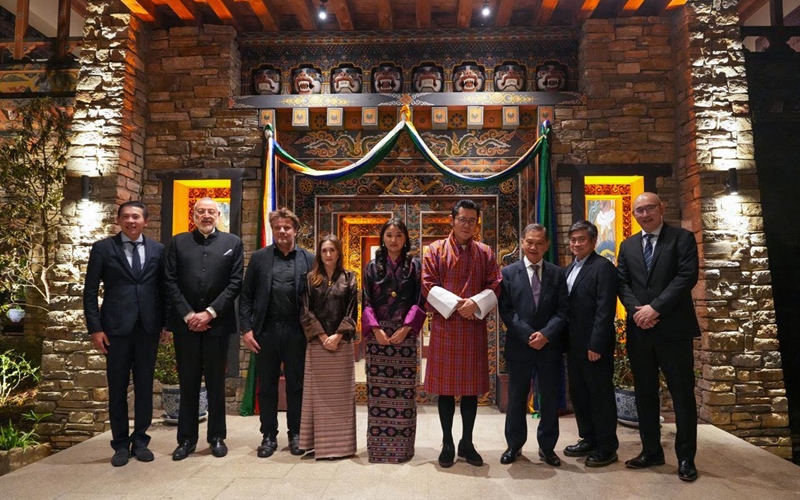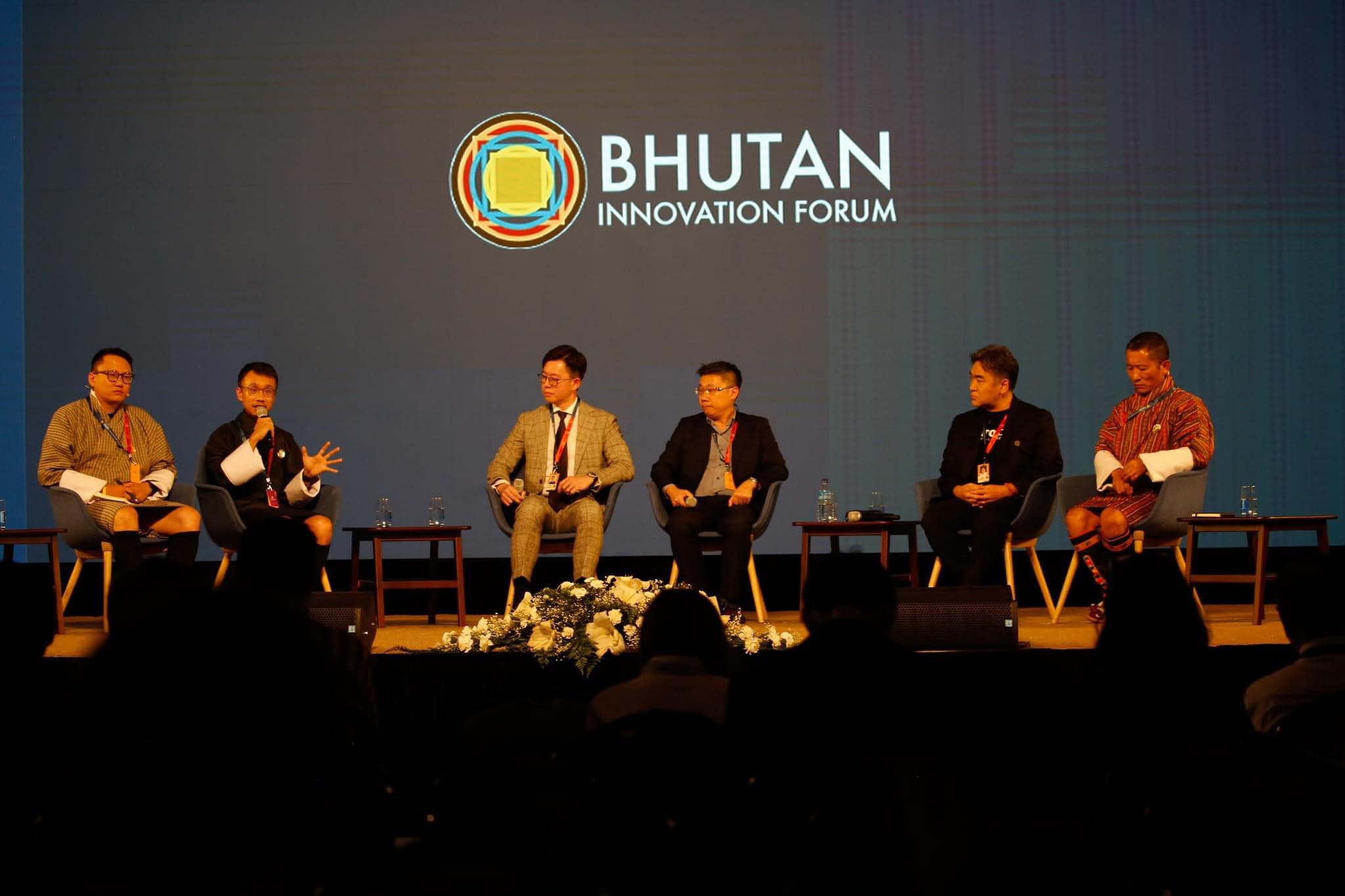Bhutan Appoints Key Leaders to Drive Gelephu Mindfulness City and Adopts Singaporean Law
His Majesty has appointed key roles for the Gelephu Mindfulness City project and GMC will adopt Singaporean law as its primary legal framework.
 From left to right: Seow Hiang Lee, Arun Kapur, Bjarke Ingels, Lauren Chung, Their Majesties, Mun Leong Liew, Joichi “Joi” Ito, Yee Ean Pang.
(Source: His Majesty King Jigme Khesar Namgyel Wangchuck Facebook Page)
From left to right: Seow Hiang Lee, Arun Kapur, Bjarke Ingels, Lauren Chung, Their Majesties, Mun Leong Liew, Joichi “Joi” Ito, Yee Ean Pang.
(Source: His Majesty King Jigme Khesar Namgyel Wangchuck Facebook Page)
Key Leaders Appointed for GMC
His Majesty the King has appointed Mun Leong Liew as CEO to lead the innovative Gelephu Mindfulness City (GMC) in the nation’s Special Administrative Region. His Majesty, who serves as the Chairman of the Board of Directors (BOD) for Mindfulness City, simultaneously appointed Liew to the BOD along with Joichi "Joi" Ito, Yee Ean Pang, Seow Hiang Lee, Arun Kapur, and Lauren Chung. Additional appointments to the Mindfulness City BOD will be announced soon.
His Majesty also named Ito as Chairman of the Gelephu Investment Development Corporation (GIDC).
With decades of global expertise, these leaders will collaborate with Bhutanese colleagues and international partners to position GMC as a model of mindful development, integrating advanced infrastructure with Bhutanese values to foster sustainable, transformative growth.
Announced by His Majesty in December 2023, GMC is envisioned as a global economic hub that redefines fundamental concepts of economic and social development.
Mun Leong Liew, leveraging his extensive experience in leading international investment and development projects, will helm the initiative. With a proven track record in urbanization, infrastructure, and airport development, Liew has successfully overseen groundbreaking projects across global markets in leadership roles with CapitaLand, Changi Airport, and Surbana Jurong Group.
As the founding president and CEO of CapitaLand Group, Liew expanded the company’s market capitalization to USD 12 billion and extended its presence to more than 20 countries, establishing it as Southeast Asia’s largest real estate group. His leadership at Changi Airport Group contributed to the creation of the internationally renowned Jewel Changi Airport, among other major developments.
These achievements position Liew to guide GMC’s strategic vision, infrastructure initiatives, and global investments. A key element of his leadership will be capacity building, particularly in developing Bhutanese talent for future leadership roles within the Gelephu Mindfulness City team.
Reflecting on his appointment, Liew stated, "I am deeply honoured to be entrusted with this leadership role and thrilled to build the team that will bring Gelephu Mindfulness City to life. This project will redefine sustainable urban living, and I am eager to collaborate with a diverse team of bright, passionate professionals to realise His Majesty’s vision. Together, we will create a truly unique city that embodies Bhutanese values while shaping the future of mindful economic growth."
Joichi "Joi" Ito has simultaneously taken on the role of Chairman of GIDC. Ito will collaborate with both Bhutanese and international counterparts to facilitate investment and economic growth in Gelephu Mindfulness City SAR, as well as other regions of Bhutan and globally. His responsibilities will include enhancing digital connectivity for the Mindfulness City and the Kingdom, as well as promoting investment in green energy sources like hydropower and solar energy. In parallel, GIDC will foster the growth of technology industries, utilizing carbon-free power to support data centers and artificial intelligence (AI) companies.
Ito’s extensive experience in the technology sector qualifies him well for this role. As the current President of Chiba Institute of Technology and former Director of the Media Lab at the Massachusetts Institute of Technology, he has been at the forefront of research and development in areas such as green energy, AI, web3, and blockchain. His involvement with The Digital Society Council of Japan’s Digital Agency and international organizations like The Mozilla Foundation and The Electronic Privacy Information Center further expands the network he brings to this project.
Commenting on his appointment, Ito remarked, "Gelephu Mindfulness City and the Kingdom of Bhutan are trailblazers in environmentally responsible and mindful development based on abundant green energy sources; entrepreneurs pushing boundaries in areas such as AI, blockchain, and drone development; and a commitment to harnessing technology to improve the human condition."
Yee Ean Pang joins the BOD with a distinguished record in greenfield and infrastructure development across Asia, managing a USD 6 billion portfolio with a strong focus on renewable energy. As the founder and director of Urbina Capital, former CEO of Surbana Jurong Capital, and Director General of Operations at the Asian Infrastructure Investment Bank, his expertise will align Gelephu’s development with triple sustainability investment strategies, ensuring economic, social, and environmental responsibility.
Seow Hiang Lee, former CEO of Changi Airport Group, brings unparalleled insights into urban development and international connectivity to the BOD. Having led Changi Airport to global recognition as the World’s Best Airport on multiple occasions, his deep understanding of the interaction between government and the private sector in driving infrastructure development and economic growth will be critical in establishing Gelephu Mindfulness City as a competitive regional economic hub.
Arun Kapur, who spearheaded the creation of the Druk Gyalpo’s Institute (DGI) in Paro, Bhutan, offers a wealth of knowledge in training and education systems. He will be instrumental in upskilling Bhutanese talent to assume leadership roles in both public and private institutions within the Mindfulness City. Kapur’s previous leadership roles with top schools in India, including as Principal of The British School and Headmaster of Vasant Valley School in New Delhi, as well as his role as Executive Director of Learn Today, have prepared him well for this challenge.
Lauren Chung, Asia Pacific CEO of Teneo, a global CEO advisory firm, contributes valuable expertise in international relations and communication strategies to the BOD. As a trusted advisor to corporate boards, CEOs, investors, governments, and civil society leaders, she has helped clients navigate economic, geo-strategic, regulatory, media, technological, and environmental changes. Chung will provide essential guidance on communications infrastructure and skills development to support the City’s global stakeholder engagement.
These new appointees attended the opening session of the Bhutan Innovation Forum on October 1, 2024 in Paro, Bhutan, where Bjarke Ingels, founding partner and creative director of Bjarke Ingels Group, presented the concept masterplan for GMC.
Together, these leaders in development, technology, and education will establish the foundation for GMC to emerge as a global model of economic and social development that harmonizes with both human spirit and the environment. As Bhutan embarks on this visionary journey, it continues to seek like-minded, visionary professionals to join this pioneering initiative, ushering in a new era of growth and mindfulness for the Kingdom and beyond.
GMC to Implement Singaporean Law as its Primary Legal Framework for Governance
The Gelephu Mindfulness City (GMC) will adopt Singaporean law as its primary legal framework to establish a strong foundation for governing various sectors in the Special Administrative Region (SAR) envisioned by His Majesty the King.
Ben Gaw, the managing director of legal affairs for GMC, stated that while the core legal structure will draw from Singaporean law, the GMC will also incorporate international best practices to create a comprehensive system. As a new city, GMC aims to foster business growth while ensuring solid legal processes.
Gaw explained that creating entirely new laws could lead to public confusion, and since Singaporean law is a globally recognized framework, it is a more accessible choice for residents and businesses. "Many countries have adopted these laws, which will make GMC a secure place for businesses," he said, emphasizing the importance of a strong legal foundation.
In Phase 1, the focus will be on business regulations and legal processes to ensure safe and compliant operations. Civil and criminal laws will also be established to promote law-abiding behavior among residents and businesses.
As GMC expands, Phase 2 will introduce a tailored legal code, including arbitration and specialized areas, developed in consultation with the business community. Gaw added that the legal framework must align with societal aspirations, ensuring that laws meet the needs of the populace while promoting economic growth.
As a business hub, GMC will also prioritize eco-friendly regulations, including those related to tax, customs, and duties, to create a sustainable environment for businesses and residents.
Former Prime Minister Dasho Dr. Lotay Tshering, a core member of the GMC project, highlighted that while Gelephu has the authority to create its own regulations, leveraging proven frameworks from other nations will save time and simplify the process. "We don’t need to waste time explaining the rules since they are already in practice elsewhere," he explained.
However, he acknowledged that the legal framework will evolve to meet the city's changing needs over time. GMC aims to create a modern, flexible legal system that fosters innovation and growth, ensuring the city thrives as a business and innovation hub.





